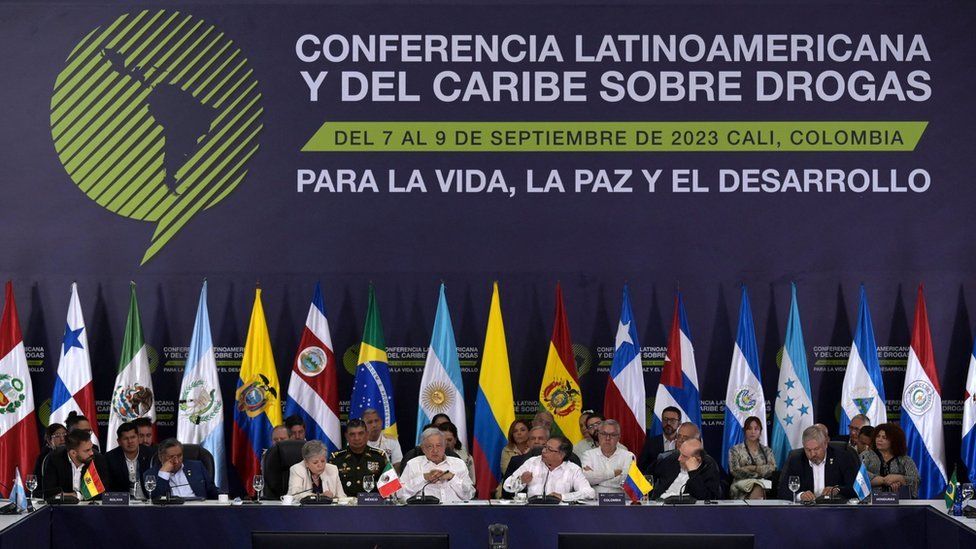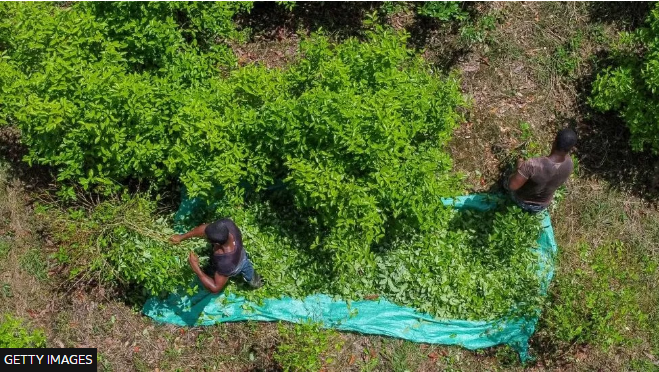The area planted with coca bushes in Colombia reached a record high last year, an annual UN report says.
The United Nations Office on Drugs and Crime (UNODC) said that potential coca production had risen by 24% since 2021.
Coca leaves are the key ingredient in cocaine and Colombia has long been the top producer of the illegal drug.
The area planted with coca bushes rose by 13%, and the biggest increase was recorded in Colombia's border areas.
Almost two-thirds of the coca crops are found in the provinces of Nariño and Putumayo, which border Ecuador, and in Norte de Santander, on the Venezuelan border.
There has been a 77% rise in in coca cultivation in Putumayo, which shares a border with Peru and Ecuador.
Candice Welsch, UNODC's regional director, said that it was "worrying that each year there is an increase in coca crops in the country".

Colombian Justice Minister Néstor Osuna said that his country was "flattening the curve" and that the rate of increase was much lower than in 2021.
The UNODC's Leonardo Correa however warned that there had been a sharp rise in potential coca production in 2022.
"The crops that were young last year have now reached maturity and are now productive. In other words, the rate of growth in hectares is decreasing. But the rate of cocaine production is increasing," he said.
Both the size of the area planted with coca in Colombia and the potential coca production are at their highest since the UN began monitoring in 2001.
Colombia is the top coca cultivator in the world, producing 60% of the world's cocaine, followed by Peru and Bolivia.
President Gustavo Petro on Saturday appealed to his regional counterparts to turn away from a militarised approach to fighting drug use and instead see it as a public health issue.
"It is time to rebuild hope and not repeat the bloody and ferocious wars, the ill-named 'war on drugs', viewing drugs as a military problem and not as a health problem for society," he said at the Latin American and Caribbean Conference on Drugs in Cali.

His Mexican counterpart, Andrés Manuel López Obrador said it was key to "fight first and foremost against poverty and inequality, and to offer work and good salaries".
He said growers needed to be convinced "to switch from sowing marijuana, poppies and coca to planting beans, corn, cocoa and fruit trees".
Mexico is the base for some of the most powerful transnational drug cartels that control trafficking routes from South America to the United States and Europe.
It also produces large amounts of heroin, cannabis, methamphetamine and synthetic opioids such as fentanyl.
Latest Stories
-
The Great ECG Container Heist: A Comedy of Errors
11 minutes -
Re: Petition against Justice Gabriel Scott Pwamang JSC
1 hour -
Starmer and Trump discuss ‘productive negotiations’ on economic deal
3 hours -
Napoli beat AC Milan to keep pressure on Inter
3 hours -
Rare Roman coin fetches nearly £5,000 at auction
3 hours -
MTN FA Cup: Kwame Opoku’s late strike sends Kotoko through to semifinals
3 hours -
Why British boarding schools are so eager to open in Nigeria
3 hours -
Usher opens 10-night London residency, with mixed results
3 hours -
Chair of charity Harry quit calls prince’s brand ‘toxic’
3 hours -
More Myanmar quake survivors pulled from rubble
4 hours -
Trump ‘very angry’ with Putin over ceasefire negotiations
4 hours -
Trump says he ‘couldn’t care less’ about higher car prices
4 hours -
UK prepared to retaliate against US tariffs, No 10 sources say
4 hours -
Former GPHA boss questions ECG missing containers scandal
5 hours -
Narrow escape for driver, mate as vehicle overturns with goods at Kabampe
5 hours

